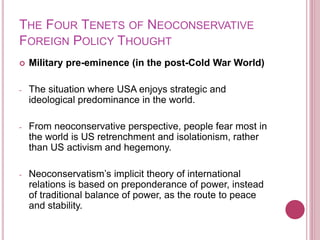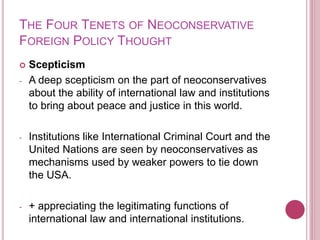Neoconservatism and the domestic sources of American Foreign Policy
- 1. NEOCONSERVATISM AND THE DOMESTIC SOURCES OF AMERICAN FOREIGN POLICY: THE ROLE OF IDEAS IN OPERATION IRAQI FREEDOM Subject: Foreign Policy Analysis Lecturer: Ibrahim Koncak Student: Zarina Abzalilova INTERNATIONAL ATATÃœRK ALATOO UNIVERSITY Department of International Relations
- 2. NEOCONSERVATISM AS DOMESTIC SOURCE OF AMERICAN FOREIGN POLICY  The strong international ‘rally behind America’ sentiment in the aftermath of the 9/11 attacks was replaced by both dissent and resentment as the Bush administration launched a preventive war against Iraq.  The failure to find weapons of mass destruction (WMDs) in Iraq, the US mistreatment of prisoners in Baghdad’s Abu Gharib prison, and the eruption of a vicious civil war in Iraq made the international community dubious about intentions, competence, and moral stature of the USA.
- 3. THE FOUR TENETS OF NEOCONSERVATIVE FOREIGN POLICY THOUGHT ï‚¢ Moral Clarity - about the forces of good and evil in the international area. - This moral clarity or certainty is starkly articulated in terms of the internal characteristics of state democratic leaders and democracies are good; tyrants and tyrannical regimes are bad.
- 4. THE FOUR TENETS OF NEOCONSERVATIVE FOREIGN POLICY THOUGHT  Military pre-eminence (in the post-Cold War World) - The situation where USA enjoys strategic and ideological predominance in the world. - From neoconservative perspective, people fear most in the world is US retrenchment and isolationism, rather than US activism and hegemony. - Neoconservatism’s implicit theory of international relations is based on preponderance of power, instead of traditional balance of power, as the route to peace and stability.
- 5. THE FOUR TENETS OF NEOCONSERVATIVE FOREIGN POLICY THOUGHT  Neoconservatives worry less about counter- coalitions for two reasons: 1. They believe that fair-minded nations will appreciate the benevolent nature of US hegemony 2. Nations refuse to give that USA the benefit of the doubt will simply have to live with, or in fear of, America’s overwhelming power.
- 6. THE FOUR TENETS OF NEOCONSERVATIVE FOREIGN POLICY THOUGHT  Leverage of military power - willing to use military force to pursue its foreign policy goals. Gulf War (1990-1991) showing ‘cruise missiles capable of making right angle turns’ - Neoconservative argument for the utility of force stems from the first two premises: If one’s ends are noble and good, one be morally derelict if one did not use all the means at one’s disposal – including military force – in pursuit of those ends (such as democratization)
- 7. THE FOUR TENETS OF NEOCONSERVATIVE FOREIGN POLICY THOUGHT ï‚¢ Scepticism - A deep scepticism on the part of neoconservatives about the ability of international law and institutions to bring about peace and justice in this world. - Institutions like International Criminal Court and the United Nations are seen by neoconservatives as mechanisms used by weaker powers to tie down the USA. - + appreciating the legitimating functions of international law and international institutions.
- 8. NEOCONSERVATIVES AND THE SLAYING OF THE IRAQI MONSTER  Applying the tenets of neoconservative foreign policy thought to Saddam Hussein’s Iraq: - Saddam is the №.1 ‘axis of evil’; regime change leading to a domestic Iraq is the first step of democratizing the Middle East - Regime change in Iraq will remove a major adversary and reinforce US power in the Middle East - Saddam possesses WMDs (weapons of mass destruction), containment is not working, military force is the only way to achieve US goals. - UN resolution is unnecessary; ‘coalition of the willing is sufficient’
- 9. THANK YOU FOR ATTENTION! <3









